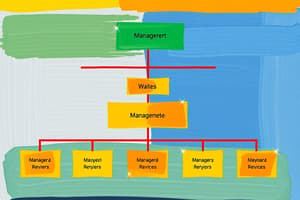Podcast
Questions and Answers
What fundamental purpose does a mission statement serve within an organization?
What fundamental purpose does a mission statement serve within an organization?
- It provides a detailed operational plan for the organization.
- It defines the organization's existence and differentiates it from others. (correct)
- It specifies the strategic alliances the organization will pursue.
- It outlines the financial objectives of the organization.
How does an effective mission statement impact employees within an organization?
How does an effective mission statement impact employees within an organization?
- It limits the creativity of employees in their roles.
- It gives employees a clear sense of direction and opportunity. (correct)
- It increases competition among employees.
- It focuses exclusively on individual performance metrics.
Which of the following statements best describes the role of a visionary in an organization?
Which of the following statements best describes the role of a visionary in an organization?
- A visionary merely implements existing solutions to problems.
- A visionary sees the need for change and prepares solutions proactively. (correct)
- A visionary only focuses on maintaining the current status of the business.
- A visionary relies primarily on historical data to guide decisions.
Which of the following elements is NOT typically included in an effective mission statement?
Which of the following elements is NOT typically included in an effective mission statement?
What key aspect of a vision statement is emphasized in the content provided?
What key aspect of a vision statement is emphasized in the content provided?
What is the primary function of top management within an organization?
What is the primary function of top management within an organization?
Which of the following best describes interpersonal roles in management?
Which of the following best describes interpersonal roles in management?
Which managerial role is responsible for representing the organization during ceremonial activities?
Which managerial role is responsible for representing the organization during ceremonial activities?
What characterizes the decisional roles of managers?
What characterizes the decisional roles of managers?
How many roles did Henry Mintzberg identify as common to the work of all managers?
How many roles did Henry Mintzberg identify as common to the work of all managers?
Which aspect of a managerial role involves influencing subordinates to achieve organizational objectives?
Which aspect of a managerial role involves influencing subordinates to achieve organizational objectives?
What is one of the three major categories of managerial roles identified in the content?
What is one of the three major categories of managerial roles identified in the content?
What is the primary focus of Total Quality Management (TQM)?
What is the primary focus of Total Quality Management (TQM)?
Which stage in the systems theory involves processing inputs into goods and services?
Which stage in the systems theory involves processing inputs into goods and services?
In the context of planning, which question does not typically need to be addressed?
In the context of planning, which question does not typically need to be addressed?
What characteristic is essential for effective leadership in planning for change?
What characteristic is essential for effective leadership in planning for change?
Which management function directly sets the direction for other functions and teamwork?
Which management function directly sets the direction for other functions and teamwork?
What does the quantitative management attitude primarily utilize?
What does the quantitative management attitude primarily utilize?
Which concept refers to understanding the overall influences from both inside and outside the organization?
Which concept refers to understanding the overall influences from both inside and outside the organization?
What is the main advantage of effective planning for an organization?
What is the main advantage of effective planning for an organization?
Which of the following is NOT a part of the planning process?
Which of the following is NOT a part of the planning process?
Which of the following techniques is associated with operations management?
Which of the following techniques is associated with operations management?
What does the principle of entropy imply about systems?
What does the principle of entropy imply about systems?
What does synergy in an organizational context refer to?
What does synergy in an organizational context refer to?
Which statement best describes the contingency theory of management?
Which statement best describes the contingency theory of management?
How does contingency theory view the relationship between organizations and their environments?
How does contingency theory view the relationship between organizations and their environments?
What is a fundamental assumption of the contingency approach?
What is a fundamental assumption of the contingency approach?
What does it mean when a subsystem fails according to system theory?
What does it mean when a subsystem fails according to system theory?
Which of the following best captures the essence of the systems theory regarding organizations?
Which of the following best captures the essence of the systems theory regarding organizations?
What is a notable aspect of situational management style in contingency theory?
What is a notable aspect of situational management style in contingency theory?
What does the contingency theory suggest about universal management practices?
What does the contingency theory suggest about universal management practices?
What is the primary function of policies within an organization?
What is the primary function of policies within an organization?
Which feature distinguishes procedures from policies?
Which feature distinguishes procedures from policies?
How do rules differ from policies in an organizational context?
How do rules differ from policies in an organizational context?
What time horizon does long range planning typically cover?
What time horizon does long range planning typically cover?
Which of the following best describes intermediate range plans?
Which of the following best describes intermediate range plans?
Which statement is true regarding the application of procedures?
Which statement is true regarding the application of procedures?
What is a characteristic of rules within organizational structures?
What is a characteristic of rules within organizational structures?
In what way do policies ensure organizational consistency?
In what way do policies ensure organizational consistency?
What distinguishes rules from procedures in a workplace?
What distinguishes rules from procedures in a workplace?
Which aspect of policies is most crucial for managers at various levels?
Which aspect of policies is most crucial for managers at various levels?
Flashcards
Top Management
Top Management
The top manager sets the overall direction for the organization. Their main job is to make long-term plans.
Middle Management
Middle Management
Middle managers carry out the plans set by top management and guide lower-level managers.
Supervisors
Supervisors
Supervisors are directly responsible for the daily work of employees.
Managerial Roles
Managerial Roles
Signup and view all the flashcards
Figurehead Role
Figurehead Role
Signup and view all the flashcards
Leader Role
Leader Role
Signup and view all the flashcards
Liaison Role
Liaison Role
Signup and view all the flashcards
Subsystem
Subsystem
Signup and view all the flashcards
Entropy
Entropy
Signup and view all the flashcards
Synergy
Synergy
Signup and view all the flashcards
Contingency Theory
Contingency Theory
Signup and view all the flashcards
Open System
Open System
Signup and view all the flashcards
Situational Management
Situational Management
Signup and view all the flashcards
Situational Approach
Situational Approach
Signup and view all the flashcards
Management's Responsibility (System Theory)
Management's Responsibility (System Theory)
Signup and view all the flashcards
Subsystem Failure
Subsystem Failure
Signup and view all the flashcards
What is planning?
What is planning?
Signup and view all the flashcards
Why is planning important?
Why is planning important?
Signup and view all the flashcards
What steps are involved in planning?
What steps are involved in planning?
Signup and view all the flashcards
Who is involved in planning?
Who is involved in planning?
Signup and view all the flashcards
How does planning consider the future?
How does planning consider the future?
Signup and view all the flashcards
How does planning help organizations adapt to change?
How does planning help organizations adapt to change?
Signup and view all the flashcards
How does planning impact resource allocation?
How does planning impact resource allocation?
Signup and view all the flashcards
How does planning help measure progress?
How does planning help measure progress?
Signup and view all the flashcards
What are key considerations in planning?
What are key considerations in planning?
Signup and view all the flashcards
How does leadership play a role in planning?
How does leadership play a role in planning?
Signup and view all the flashcards
What are policies?
What are policies?
Signup and view all the flashcards
What are procedures?
What are procedures?
Signup and view all the flashcards
What are rules?
What are rules?
Signup and view all the flashcards
Define long-range plans.
Define long-range plans.
Signup and view all the flashcards
What are intermediate plans?
What are intermediate plans?
Signup and view all the flashcards
What are short-range plans?
What are short-range plans?
Signup and view all the flashcards
What is a mission?
What is a mission?
Signup and view all the flashcards
What is a vision?
What is a vision?
Signup and view all the flashcards
What are crucial elements of a mission statement?
What are crucial elements of a mission statement?
Signup and view all the flashcards
What role does a visionary leader play?
What role does a visionary leader play?
Signup and view all the flashcards
What characteristics make a mission statement powerful?
What characteristics make a mission statement powerful?
Signup and view all the flashcards
Study Notes
Fundamentals of Management
- Organizations are groups of people working together to achieve a set of goals.
- A goal is a desired future condition that the organization strives to achieve.
- Management is the process of using organizational resources (human, financial, physical, and informational) to achieve organizational goals efficiently and effectively. This involves planning, organizing, leading, and controlling.
- Management activities include planning, decision making, organizing, leading, and controlling the resources (human, financial, physical, and informational).
- Technical efficiency is output quantity divided by input quantity.
- Effectiveness measures the appropriateness of chosen goals and the degree to which they are met. It is getting the right product to the right person at a reasonable cost.
Organizational Performance
- Efficiency is a measure of how well resources are used to achieve a goal (maximizing productivity by utilizing scarce resources).
- Effectiveness measures the suitability of the goals chosen (providing the right product for the right person efficiently) and the extent to which these goals are achieved.
- Organizational performance tracks how efficiently and effectively managers use resources to satisfy customers and achieve organizational goals.
Who Are Managers?
- A manager is a person whose primary responsibility is to carry out the management process including planning, decision making, organizing, leading, and controlling human, financial, physical, and informational resources.
- Effective managers have a strong sense of responsibility, belonging, and accountability.
- Managers who take initiative and efficiently combine factors of production are effective leaders.
Becoming a Manager: Education and Experience
- Initial job experience through a variety of job assignments is important for becoming a manager.
- Successful acquisition and effective utilization of basic management skills are crucial.
- Sound formal education and ongoing life-long education help manage complexity.
Significance of Management
- Effective coordination of resources is vital for organizational success.
- Management impacts the economic, social, and political goals of a country.
- The management process is essential for utilizing scarce resources effectively and appropriately.
- Organizational effectiveness and efficiency heavily depend on the proper management system.
Managerial Functions
- Planning, organizing, leading, and controlling are the basic managerial functions.
- Planning involves developing a systematic process to reach organizational goals.
- Organizing involves arranging resources like personnel and supplies to carry out a plan.
- Leading involves guiding, motivating, and directing employees.
- Controlling involves monitoring performance and correcting deviations from plans.
Four Functions of Management
- Planning, organizing, leading, and controlling are interconnected.
- Planning sets organizational goals, deciding how to achieve them.
- Organizing structures relationships between workers and resources (to work together).
- Leading motivates workers to act in best interests of the organization.
- Controlling ensures that plans are implemented correctly and that goals are met.
Planning
- Planning involves identifying goals and courses of action.
- Planning comprises the steps of determining goals, how to reach them, and how to assign resources.
- Key steps in planning include defining a problem, generating alternatives, evaluating alternatives, selecting the best alternative, implementing the plan, and evaluating and controlling the results.
Types of Plans
- Single-use plans are designed for one-time events (e.g. project, program).
- Standing plans are for repeated or continuous activities (e.g. policies, procedures, rules).
- Long-range plans cover a 5-10 year future.
- Short-range plans target the near future.
Managerial Roles and Skills
- Ten roles are identified that managers fulfill in organizations: interpersonal, informational, and decisional.
- Managerial roles include figurehead, leader, liaison, monitor, disseminator, spokesperson, entrepreneur, disturbance handler, resource allocator, and negotiator.
- Managers require conceptual, human, and technical skills. Conceptual skills involve problem-solving and strategic thinking, human skills involve understanding and motivating people, and technical skills involve expertise in a specific field.
Leadership
- Leadership influences employees to meet organizational objectives..
- Effective leadership style varies with the situation.
- Situational leadership emphasizes adapting leadership style based on the specific situation that may include factors like member relationships, task structure, or leader's position power.
- Leadership theories include trait theory, behavioral theory, contingency theory, and transactional and transformational approaches.
Motivation
- Motivation is the internal drive to pursue and meet needs.
- Motivational theories include Maslow's Hierarchy of Needs, Herzberg's Two-Factor Theory (Hygiene factors and motivators), McClelland's Learned Needs (achievement, power, affiliation), and Alderfer's ERG Theory (existence, relatedness, growth).
- Management theories focus more on how the manager should influence the employees.
The Controlling Function
- Controlling is crucial to evaluating how effectively plans are implemented and bringing results up to expectations.
- Controlling involves identifying standards, measuring performance, comparing results to standards, and taking corrective actions.
- Different types of controls can be applied at various points in the process (feed-forward, concurrent, feedback).
- Controlling uses financial, operational and qualitative techniques to ensure goals are met.
Decision-Making
- Managers constantly decide on goals and methods for getting work done.
- Decisions can be classified as programmed (recurring tasks) or non-programmed (unique circumstances.)
- Rational decision-making involves steps like defining the problem, collecting information, generating alternatives, analysing alternatives, selecting the best alternative, implementing the plan, and following up on results.
Studying That Suits You
Use AI to generate personalized quizzes and flashcards to suit your learning preferences.




